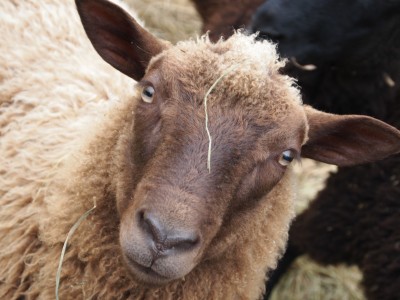Do you realize that God uses the terms “peculiar” and “sheep” to describe you and me? Truth be known, sheep are a very peculiar lot. Learning more about sheep will help you see our common characteristics. You’ll also be amazed at “why” God really does deserve praise from us “peculiar” ones. (1 Peter 2:9)
A little know fact about sheep is that they can get top heavy. When a wooly sheep lies down to rest, it can “cast” itself which means it unwittingly tips onto its back, legs flailing in the air, rendering it totally helpless and stuck. Quickly, it looses circulation to its legs, grows weak, and becomes an easy target for any predator. Unless a watchful, caring shepherd realizes the sheep is missing, it will die. When a good shepherd counts his sheep and finds any missing, he immediately seeks for the “lost” sheep. He knows it is a matter of life and death. When he finds a cast sheep, he places it on his shoulders because of its temporarily numb legs and rejoices that He has saved a life (or more if it is a pregnant ewe) and earned the sheep’s trust. (Luke 15:4-6)
Sheep are timid creatures, easily spooked. In order for them to truly rest, they require total freedom from fear and freedom from friction within the flock (“butting order” stresses). The shepherd’s watchful eye assures he’ll show up quickly when the enemy threatens. By defending the sheep, he brings a sense of security to his flock. His presence also brings peace by averting the more aggressive sheep from viciously “butting” ones lower on the popularity pole.
Sheep also require total freedom from the torment of flies and ticks and freedom from hunger. The shepherd anoints each sheep’s head with oil to protect their sensitive membranes from merciless, tormenting pests. He plans beneficial pasture rotations giving his sheep the satisfaction of lush green fields in which to eat and rest in every season.
The shepherd’s main goal is to insure the well-being of his flock–individually and corporately. With their four nonnegotiable needs met, the sheep thrive and bring great satisfaction to their shepherd. His constant care and diligent management cultivates trust and love. His sheep learn His voice and won’t follow any other shepherd. (John 10:4)
Then, sadly, there is the head-strong, (stubborn, self-willed, proud, self-sufficient) sheep. Just like we humans, these sheep insist upon going their own way, usually to their detriment. (Isaiah 53:6)
Phillip Keller points out in his book, A Shepherd Looks At Psalm 23:
” … sheep will blindly, habitually, stupidly follow one another along the same little trails until they become ruts … “.
These types of sheep don’t want to follow the shepherd and don’t want to be led toward the better way. But a good shepherd keeps a more watchful eye on these sheep knowing their propensity toward self destructive behaviors. It is only when every effort to change the sheep’s behavior has failed that the shepherd is forced to remove that sheep from the flock thereby keeping others from learning and repeating the self-destructive behavior. This last resort is a source of great sorrow for a caring shepherd.
If you’ve always thought sheep can pretty much get along anywhere, on their own, without a problem, you are wrong. Sheep need the shepherd’s full attention, everyday, all day, even while they rest. (Psalm 121:3) Only one shepherd can give that kind of attention to His peculiar sheep. His name is Jesus. He desires to know each one intimately and longs for us to follow His lead. As peculiar and unique as we each are, He is able to bring all those who will follow and obey Him into the House of the Lord to dwell therein forever. (Psalm 23:6)
How has realizing some facts about sheep moved you to praise God with a deeper appreciation of His loving care?
For more on the topic of our relationship to the Good Shepherd, read my article: “Will You Choose the Good Shepherd?“
 The Bottom Line, Ministries Christian News, Articles, & Poetry
The Bottom Line, Ministries Christian News, Articles, & Poetry 




